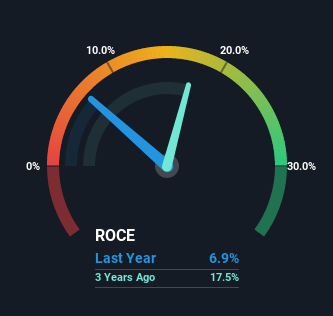- India
- /
- Auto Components
- /
- NSEI:INDNIPPON
India Nippon Electricals (NSE:INDNIPPON) Is Reinvesting At Lower Rates Of Return
If we want to find a potential multi-bagger, often there are underlying trends that can provide clues. Firstly, we'd want to identify a growing return on capital employed (ROCE) and then alongside that, an ever-increasing base of capital employed. This shows us that it's a compounding machine, able to continually reinvest its earnings back into the business and generate higher returns. However, after investigating India Nippon Electricals (NSE:INDNIPPON), we don't think it's current trends fit the mold of a multi-bagger.
Understanding Return On Capital Employed (ROCE)
For those that aren't sure what ROCE is, it measures the amount of pre-tax profits a company can generate from the capital employed in its business. The formula for this calculation on India Nippon Electricals is:
Return on Capital Employed = Earnings Before Interest and Tax (EBIT) ÷ (Total Assets - Current Liabilities)
0.069 = ₹367m ÷ (₹6.4b - ₹1.1b) (Based on the trailing twelve months to March 2022).
Thus, India Nippon Electricals has an ROCE of 6.9%. In absolute terms, that's a low return and it also under-performs the Auto Components industry average of 11%.
View our latest analysis for India Nippon Electricals

Historical performance is a great place to start when researching a stock so above you can see the gauge for India Nippon Electricals' ROCE against it's prior returns. If you're interested in investigating India Nippon Electricals' past further, check out this free graph of past earnings, revenue and cash flow.
What Does the ROCE Trend For India Nippon Electricals Tell Us?
When we looked at the ROCE trend at India Nippon Electricals, we didn't gain much confidence. Around five years ago the returns on capital were 12%, but since then they've fallen to 6.9%. Although, given both revenue and the amount of assets employed in the business have increased, it could suggest the company is investing in growth, and the extra capital has led to a short-term reduction in ROCE. And if the increased capital generates additional returns, the business, and thus shareholders, will benefit in the long run.
In Conclusion...
In summary, despite lower returns in the short term, we're encouraged to see that India Nippon Electricals is reinvesting for growth and has higher sales as a result. In light of this, the stock has only gained 33% over the last five years. So this stock may still be an appealing investment opportunity, if other fundamentals prove to be sound.
India Nippon Electricals does have some risks, we noticed 3 warning signs (and 2 which are a bit unpleasant) we think you should know about.
If you want to search for solid companies with great earnings, check out this free list of companies with good balance sheets and impressive returns on equity.
The New Payments ETF Is Live on NASDAQ:
Money is moving to real-time rails, and a newly listed ETF now gives investors direct exposure. Fast settlement. Institutional custody. Simple access.
Explore how this launch could reshape portfolios
Sponsored ContentNew: AI Stock Screener & Alerts
Our new AI Stock Screener scans the market every day to uncover opportunities.
• Dividend Powerhouses (3%+ Yield)
• Undervalued Small Caps with Insider Buying
• High growth Tech and AI Companies
Or build your own from over 50 metrics.
Have feedback on this article? Concerned about the content? Get in touch with us directly. Alternatively, email editorial-team (at) simplywallst.com.
This article by Simply Wall St is general in nature. We provide commentary based on historical data and analyst forecasts only using an unbiased methodology and our articles are not intended to be financial advice. It does not constitute a recommendation to buy or sell any stock, and does not take account of your objectives, or your financial situation. We aim to bring you long-term focused analysis driven by fundamental data. Note that our analysis may not factor in the latest price-sensitive company announcements or qualitative material. Simply Wall St has no position in any stocks mentioned.
About NSEI:INDNIPPON
India Nippon Electricals
Manufactures and sells electronic ignition systems for the automotive industry in India and internationally.
Flawless balance sheet with proven track record and pays a dividend.
Similar Companies
Market Insights
Weekly Picks

THE KINGDOM OF BROWN GOODS: WHY MGPI IS BEING CRUSHED BY INVENTORY & PRIMED FOR RESURRECTION


Why Vertical Aerospace (NYSE: EVTL) is Worth Possibly Over 13x its Current Price


The Quiet Giant That Became AI’s Power Grid
Recently Updated Narratives


MINISO's fair value is projected at 26.69 with an anticipated PE ratio shift of 20x


Fiverr International will transform the freelance industry with AI-powered growth

Stride Stock: Online Education Finds Its Second Act
Popular Narratives


MicroVision will explode future revenue by 380.37% with a vision towards success


Crazy Undervalued 42 Baggers Silver Play (Active & Running Mine)





